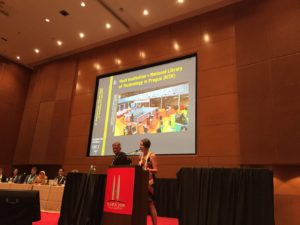My colleague Alena, as promised, attended the recent Anywhere Access (AA) webinar. AA aims to become “as fast as Sci-Hub” and to streamline the search-to-PDF workflow for researchers. Marketing heavily to researchers directly, AA aims to lock libraries in to purchasing subscriptions for its service (see this comparison of its features with other discovery mechanisms). For well-funded institutions, getting on board is perhaps a no brainer, providing its functionality lives up to the hype.
But many of us in the library community worry about the accessibility of such tools to institutions without the funds to purchase them in terms of making more pressure on libraries to provide such services – pressure on institutions which may already be falling behind the wealthy institutions because of budgetary pressures due to subscription journal increases and other factors, expanding the effects of the digital divide. What would stop people in such cases from continuing to use P2P servers to access content their libraries cannot purchase or which are not available via open access? I cannot imagine that, in these cases, such libraries will be able to “disrupt the disrupters,” as promoted in the webinar follow-up email. AA will need critical subscription mass.
It can also mean, for wealthy institutions, that once the “lock” happens, subscription to the tool becomes difficult to discontinue in the future. And if there are only one or two good players in this space (and not a fully competitive marketplace, as currently appears to be the case), this always opens up the door to steep future fee increases and, at some point, threats to a long-term funding model, on the library side. But of course, the end users might not care about such worries. Should they?
It’s not just librarians who are concerned about big mergers and marketplace “consolidation”; smaller academic society publishers, too, are facing similar issues, as seen in an article by Angela Cochran from the American Society of Civil Engineers in The Scholarly Kitchen:
I am concerned about what I will call ‘lock out.’ As some librarians are concerned about their faculty, students, and institutions being ‘locked in’ to one particular publisher’s services, I am concerned about society and small publishers being ‘locked out’ of critical technology services.
She discusses these issues in relation to Wiley and Elsevier:
Many of us on the Atypon platform were varying degrees of concerned about the sale to Wiley. The concerns were entirely about a publisher owning the platform that housed the content of many other publishers. We are faced with the same situation now that Elsevier has bought Aries Systems. A publisher that competes with many of Aries Systems’ customers, now owns the submission and production system used by these publishers.
For some of us, like my organization (American Society of Civil Engineers), it’s a double-whammy. Our platform with all of its content and user data is owned by Wiley. Our submission system with all of our author and editorial data is owned by Elsevier.
Read the full article, “Clowns to the Left of Me…Jokers to the Right,” at: https://scholarlykitchen.sspnet.org/2018/08/06/clowns-left-jokers-right-independent-publisher-age-mergers-acquisitions/

